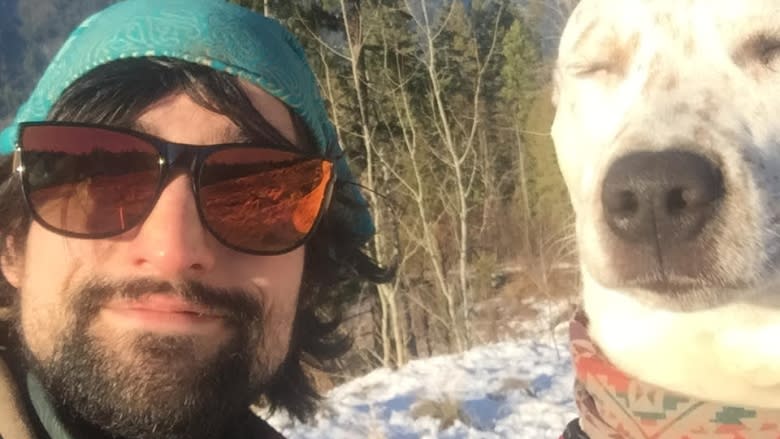Former student sued by RBC for $170K rejects $17K settlement offer, says bank discriminated against him
A former medical school student from Dauphin, Man., whose mental illness forced him to drop out of university is rejecting a settlement offer that would have reduced his $170,000 debt to the Royal Bank of Canada by 90 per cent.
Bryan Robson, 26, filed a human rights complaint after RBC sued him for $170,000 for an unpaid student line of credit.
The Canadian Human Rights Commission has been negotiating with RBC and reached a settlement offer of $17,000 in November, which Robson recently refused to accept.
He hopes that by instead sharing the details of the offer, he can help other students who are ill and owe money to the bank.
"To me that information was more valuable. That's why I wouldn't accept it. And I don't have $17,000. Nor do I think they [the bank] deserve it," he said.
Robson got an RBC line of credit when he started studies at the University of Saskatchewan's medical school in 2012, knowing he wouldn't be able to afford the $14,000 per year for tuition, books and living expenses.
But two years into his program, he started experiencing intense anxiety and depression. He was eventually diagnosed with bipolar affective disorder and had to leave the program for good.
When the bank pursued litigation to retrieve the money he'd borrowed on his line of credit, Robson went to the Canadian Human Rights Commission, citing discrimination based on disability. He said an RBC employee told him after he dropped out of the program that the disability insurance he'd signed up for covered physical, but not mental, illness.
He also later learned that insurance for the line of credit also only applied if he was working.
"The disability insurance should've protected me," he said.
Human Rights Commission negotiates settlement
In the spring, the Human Rights Commission negotiated with RBC to get the repayment amount lowered to $50,000. But Robson said that amount, too, was insurmountable for him.
"I felt helpless, I felt trapped, I felt not listened to, I felt further victimized, I suppose."
In November, after more negotiations between the Human Rights Commission and RBC, the repayment amount dropped to $17,000. Robson said a family member even offered to cover that amount for him.
"It didn't feel right just to let them dig me out of it. It came down to a matter of integrity," he said.
Instead, Robson asked that his file with the Human Rights Commission be sent to the commission's investigations unit, which will withdraw the offer of settlement, allowing RBC to proceed with action to collect the money it says Robson owes.
From the investigations stage, his file will either be dismissed, referred to a tribunal for a public hearing, or go to a conciliator who will negotiate a new settlement between Robson and the bank.
Insurance covers mental, physical disabilities: RBC
In a statement, a spokesperson for RBC wrote, "We recognize that this is a difficult situation for Mr. Robson. We have worked extensively with him to negotiate a repayment plan and remain open to resolving this matter."
The spokesperson said that the RBC creditor disability insurance coverage covers both mental and physical disabilities, and applicants are made aware of eligibility requirements. RBC says clients are advised of their coverage again after the line of credit has been approved.
However, for some insurance, clients are only eligible for disability coverage if they are working a minimum number of hours per week at the time of the application, the spokesperson wrote.
Robson counters not enough information of the risk was shared with him when he signed up for the line of credit, and he was not able to work when he left the program because of his illness.
"These details were not in the documents I signed. These details were not adequately purveyed to me by the agents of the RBC," said Robson.
Outdoor serenity
Robson has been living in a trailer on an acreage in the Kootenay region of British Columbia. He enjoys the outdoors and writing — he's already written one book about his journey with his illness.
Though he finds his surroundings offer him peace and serenity, and his pet dog also helps stabilize his moods, it's not easy. Without being able to work, his family helps him out financially, but he often relies on the food bank and has also been homeless for periods.
"It's no secret that debt is crippling and debilitating and psychologically terrorizing. So they could've let me go to simplify it. After two years, by now I could've worked," he said.
He hopes his case is referred to a tribunal, so that the details become public. He wants an apology from RBC and for the bank to update its policies on how it informs students applying for lines of credit of exactly what the disability insurance covers.
"If I had the money and I wasn't basically homeless and hungry all the time, I might think differently. That might be different. At the end of the day, when I was 21 and signed that policy, I had no choice," he said.
He doesn't want the details of his case kept hidden, which was a condition of the offer as well, which he says is part of why he's choosing to share them.
"Those people, if this information makes them realize that they're not as trapped as they might think they are, that's why it's valuable. It's about humanism, activism. Those things they show us when we go to medical school," he said.
"It's especially valuable to me for the people who might … be in dark places. People who are at risk of self-harm. And those people, if this information makes them believe they're not as trapped as they might think they are, that's why it's valuable," he said.
"It's never as bad as you think it is, ever."



